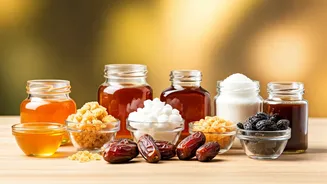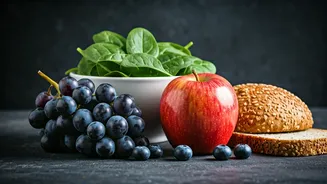Introduction: The Sweetener Shift
The consumption of refined sugar has become a significant health concern globally, including in India. Excessive intake is linked to several health issues
such as weight gain, heart disease, and type 2 diabetes. Choosing natural sweeteners is a proactive step toward a healthier lifestyle. These alternatives not only offer sweetness but also often come with additional health benefits, such as antioxidants and essential nutrients. This shift toward natural sweeteners can make a big difference in one's overall well-being, providing sweetness without the same negative impacts as refined sugar.
Stevia: The Zero-Calorie Choice
Stevia is a popular choice for those looking to cut calories. Extracted from the Stevia rebaudiana plant, it is known for its intense sweetness with almost no impact on blood sugar levels, making it suitable for people with diabetes. Stevia is versatile and can be used in beverages, baked goods, and various recipes. Its popularity has grown due to its availability in both liquid and powdered forms, allowing easy integration into diverse dietary needs. It is important to remember that while Stevia is considered safe by many regulatory bodies, it is essential to consider the quality of the product and its origin, particularly in the Indian market, to ensure purity and safety.
Monk Fruit: Nature's Sweet Gift
Monk fruit, also known as Luo Han Guo, is another natural sweetener that has gained popularity. This fruit-derived sweetener is also calorie-free and does not affect blood sugar, similar to Stevia. The sweetness comes from unique antioxidants called mogrosides. Monk fruit is often processed into a liquid or powdered form and can be used in various applications, from sweetening beverages to adding flavor to baked goods. It is a suitable alternative for those managing blood sugar levels or seeking a calorie-conscious diet. Monk fruit's increasing availability has made it a convenient option for Indian consumers seeking healthier alternatives to refined sugars, with taste profiles that complement many recipes.
Coconut Sugar: A Tasty Option
Coconut sugar is derived from the sap of the coconut palm tree. It contains nutrients like iron, zinc, and potassium, but it is important to understand its effect on blood sugar levels. While lower on the glycemic index compared to refined sugar, it still causes a rise in blood glucose, and thus should be consumed in moderation. Coconut sugar adds a unique caramel-like flavor, making it a good choice for those who enjoy a richer taste profile in their recipes. In India, where coconut and related products are common, this option provides an accessible alternative, though portion control is vital to reap its benefits without compromising blood sugar control.
Jaggery: The Traditional Sweetener
Jaggery, or gur as it is commonly known in India, has a long history as a traditional sweetener. Made from unrefined sugar cane or palm sap, jaggery retains some minerals and antioxidants. Its glycemic index is still lower than white sugar, although it also causes a rise in blood glucose levels. Jaggery is known for its distinctive molasses-like flavor and is used in various Indian sweets and dishes. The advantage of jaggery is that it is often locally available and can contribute to a diet rich in traditional Indian flavors, providing an alternative to processed sugar. However, its sugar content mandates moderation, especially for those with diabetes or watching their carbohydrate intake.
Maple Syrup: Natural and Delicious
Maple syrup, especially the pure varieties, is another natural option. This sweetener, obtained from maple tree sap, contains some trace minerals and antioxidants. Maple syrup has a slightly lower glycemic index compared to white sugar. It offers a distinct taste, making it ideal for pancakes, waffles, and other breakfast dishes. In India, its usage is less common but increasing as people are exploring international cuisines and healthier alternatives. It can be a good substitute for refined sugar in certain recipes, but its high sugar content requires careful consideration of the portions to ensure healthy consumption.
Date Sugar/Syrup: Nature's Candy
Date sugar and date syrup, derived from dates, offer a concentrated sweetness and a source of fiber and minerals. Dates are nutrient-dense and offer a unique sweetness. Date sugar is made by grinding dried dates, making it an unprocessed option. Date syrup is produced by extracting the juice from dates, resulting in a syrup with a more liquid consistency. Both are good choices for those looking to add natural sweetness with added nutritional value. Because they retain nutrients from the dates, they can be a healthier alternative to refined sugar. When it comes to Indian dietary habits, the versatility of date sugar and syrup enables easy integration into various sweets, beverages, and desserts, offering a healthy and delicious substitute for refined sugars.
Raw Honey: Nature's Nectar
Raw honey, which is honey that has not been processed, contains antioxidants and trace amounts of vitamins and minerals. Honey has a moderate glycemic index and can cause a rise in blood sugar, similar to other sweeteners. It is known for its unique flavor and is often used as a natural sweetener in various foods and drinks. In India, honey has historical relevance in traditional medicine, offering another option for individuals seeking natural alternatives to sugar. However, the high sugar content necessitates that it be consumed in moderate amounts. Choosing raw, local honey ensures that you benefit from the highest nutrient content and support local beekeepers, while also making the most of its health benefits.




















